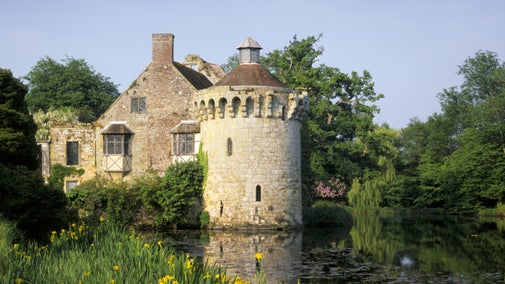
Tintagel Old Post Office's objects and collections
Explore the objects and works of art we care for at Tintagel Old Post Office on the National Trust Collections website.

Despite its name, Tintagel Old Post Office was first built over 600 years ago as a farmhouse during the medieval period. Slowly modified over the centuries, it became more fashionable than functional. The house has served many purposes over time, but it has always been a home. Its final use was as the letter-receiving office for the village during the 1870s.
The house was built in the late 14th century as a thatched house of three rooms with a through-passage. The building would originally have been a single storey dwelling, open to the roof, and would have housed livestock in the northern partition.
A central hearth in the hall would have offered warmth and provided smoke that would seep through the thatch above, keeping the building dry and killing off woodworm, preserving the wooden frames.
The main phases of redevelopment to the building took place during the 16th and 17th centuries. Local brown slate was used for the roof instead of thatch. The timber panelling in the rooms was replaced with stone and central chimney stack and fireplace were also added. Animals were now housed in a separate building.
Adding the chimney meant that the building was now smoke-free and bedrooms could be put in at either end, with the hall left open to the roof, making the building a hall house. Further additions and extensions were added over the following centuries to the existing building layout, creating a mixture of architectural styles which resulted in the unusual look the house has today
The house was used for several businesses during the Victorian period, all of which were a side-line to farming. The building is recorded as having been used as a greengrocers, dressmakers, draper’s, and shoemakers. The final use of the building was as the letter-receiving office for the village, sometime between 1870-1878.
By the late 19th century the house was in a bad state of repair and was in danger of being demolished. Thankfully, it was saved by a local group who bought the house from an auction, having raised the funds to buy it.
Following its rescue, various artworks of the house were sold, and the proceeds used to pay an Arts and Crafts architect to carry out essential maintenance and restore it to its former glory. Knowing the Old Post Office would need long-term care, the group appealed to the National Trust who agreed to look after the house and acquired it for £200 in 1903.

Explore the objects and works of art we care for at Tintagel Old Post Office on the National Trust Collections website.
The five rooms and cottage garden beckon the curious to explore over six hundred years of Cornish domestic life.

The Victorian-style cottage garden is a welcome retreat from the busy high-street. Awash with the colour throughout the year, the garden is planted with scented herbs and fragrant flowers that attract a number of insect pollinators and birds.

Learn about people from the past, discover remarkable works of art and brush up on your knowledge of architecture and gardens.

Explore the objects and works of art we care for at Tintagel Old Post Office on the National Trust Collections website.
